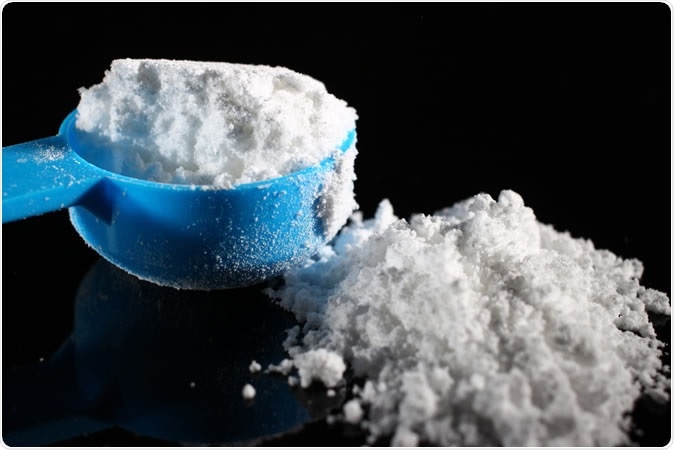The immune system functions as the body’s defense against pathogens and harmful substances, including cancer cells. They protect the body against potential harm. In cases of cancer, though the body tries to fight the tumor cells, they may become too aggressive for the immune system to eradicate.
Creatine is a popular organic acid that is widely used as a supplement by bodybuilders and athletes. A new study has found that creatine is a potent molecular battery that powers the immune cells to better fight cancer.

Creatine powder - Image Credit: Pavlo Lys/ Shutterstock
In a new study published in the Journal of Experimental Medicine, creatine uptake is vial to the anti-tumor activities of CD8 T cells, also called killer T cells. These immune cells find and destroy infected cells that have been turned into virus-making factories.
The researchers at the University of California – Los Angeles Health Services conducted the study on mice showing taking creating supplements can make current immunotherapies more effective.
"Because oral creatine supplements have been broadly utilized by bodybuilders and athletes for the past three decades, existing data suggest they are likely safe when taken at appropriate doses. This could provide a clear and expedient path forward for the use of creatine supplementation to enhance existing cancer immunotherapies,” Lili Yang, a member of the Eli and Edythe Broad Center of Regenerative Medicine and Stem Cell Research at UCLA, said.
T cells need massive energy
T cells, to fight cancer cells effectively, need massive energy. The metabolic regulators that control anti-tumor T cell immunity have just begun to be revealed. The researchers observed a rise of the CrT (Slc6a8) gene expression, which works by encoding a surface transporter that controls the uptake of creatine into a cell.
The team demonstrated that creatine uptake deficiency has affected and altered anti-tumor T cell immunity. On the other hand, when they gave creatine supplements to mice, there had been tumor suppression efficacy. Further, the researchers have found that creatine served as a molecular battery, wherein it stored and distributed energy to power the body’s fight against cancer.
"As biologists, we are always asking 'why? We could see that these tumor-battling T cells had increased their capacity to take in creatine, likely for a good reason, so we designed experiments to determine what happens when they can't get it,” Yang said.
To validate their theory, they gave non-engineered mice models creatine daily, which is similar to the safe recommended dose for bodybuilders and athletes. The boost of creatine, which was administered through an injection while in some mice, they received it through oral supplementation, gave the two groups of mice the ability to suppress both colon and skin cancer growth.
The findings of the study show that killer T cells need creatine to be able to fight cancer cells. Without creatine, they appear underpowered and can’t perform their roles effectively.
In the next series of experiments, the team will try to repeat the tests on special mouse models that contain human tumor grafts and human immune cells. This way, they can determine the proper dose and proper timing of creatine supplementation. Also, they want to see if the same mechanism is true in humans. The team expects the findings could also apply to a variety of cancers, further improving current immunotherapies.
What is creatine?
Creatine is a natural compound produced in the body from amino acids, which are the building blocks of protein. Creatine comes from many sources, such as animal proteins and dietary supplements. It has many health benefits, including help muscles, produces energy, improves high-intensity exercise performance, fights neurological diseases, lowers blood sugar levels, and supports muscular function.
The researchers recommend that people should consult a doctor before taking new supplements, such as creatine. Supplements can carry risks of drug interactions with other medicines and other potentially harmful side effects.
Journal reference:
Biase, S., Ma, X., Wang, X., Yu, Wang, Y.C., Smith, D., Zhou, Y., Li, Z., Kim, J., Clarke, N., To, A. and Yang, Li. (2019). Creatine uptake regulates CD8 T cell antitumor immunity. Journal of Experimental Medicine. http://jem.rupress.org/content/early/2019/10/17/jem.20182044